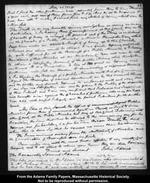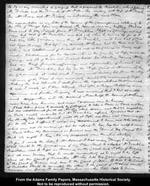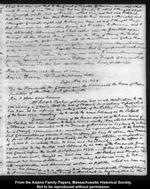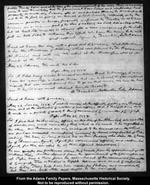May 21. 1778
But I find the other Gentlemen have expended, from three to four Thousand a Year each, and one of them from five to six. And by all the Enquiries I have been able to make, I cannot find any Article of Expence, which can be retrenched.
The Truth is, in my humble Opinion, our System is wrong in many Particulars. 1. In having three Commissioners at this Court. One in the Character of Envoy is enough. At present each of the Three is considered in the Character of a Public Minister; a Minister Plenipotentiary, which lays him under an absolute Necessity of living up to this Character. Whereas one alone would be obliged to no greater Expence, and would be quite sufficient for all the Business of a Public Minister. 2. In Leaving the Salaries of these Ministers at an Uncertainty. You will never be able to obtain a satisfactory Account, of the public Monies, while this System continues. It is a Temptation to live at too great an Expence, and Gentlemen will feel an Aversion to demanding a rigorous Account. 3. In blending the Business of a public Minister with that of a Commercial Agent. The Businesses of various departments, are by this means so blended and the public and private Expences so confounded with each other, that I am sure no Satisfaction can ever be given to the Public, of the disposition of their Interests and I am very confident that jealousies and Suspicions will hereafter arise against the Characters of Gentlemen, who may perhaps have Acted with perfect Integrity and the fairest Intentions for the public Good.
My Idea is this, seperate the Offices ofcommercial agent Public Ministers from those of commercial Agents.... Recall, or send to some other Court, all the Public Ministers but one, at this Court. Determine with Precision, the Sum that shall be allowed to the remaining one, for his Expences and for his Salary, i.e. for his Time, Risque, Trouble &c., and when this is done see that he receives no more than his allowance.
The Inconveniences arising from the Multiplicity of Ministers and the Complications of Businesses are infinite.
Remember me, with the most tender Affection to my worthy Colleagues, and to all others to whom you know they are due. I am your Friend and Servant
John Adams
The Honourable Samuel Adams
This Letter was received by Mr. Adams in due Season, who and by him communicated
to Mr. Richard Henry Lee and others. Mr. R. H. Lee wrote me immediately that he had seen it and was entirely of my Opinion. It was communicated to so many members of Congress that it produced the Revolution which followed, My Friends and the Friends of Mr. Arthur Lee uniting with those of Dr. Franklin, Mr. Deane and Mr. Izzard, in introducing the new Plan.
to Mr. Richard Henry Lee and others. Mr. R. H. Lee wrote me immediately that he had seen it and was entirely of my Opinion. It was communicated to so many members of Congress that it produced the Revolution which followed, My Friends and the Friends of Mr. Arthur Lee uniting with those of Dr. Franklin, Mr. Deane and Mr. Izzard, in introducing the new Plan.
The representation in my Letter of the Expences of the Commissioners, related only to the State of Things before my Arrival. My Expences were very trifling. I had no House rent to pay seperate from Dr. Franklins. I kept no Carriage and used none but that of Dr. Franklin and that only when he had no Use for it. I had very little Company more than Dr. Franklin would have had, if I had not been there. But before my Arrival, Mr. Deane had his House and Furniture and Establishment of Servants as well as his Carriage in Paris, and another Establishment for his Appartments in the Country at Passy and another Carriage and Set of Horses and Servants, besides his Libertine Expences. Mr. Lee had an House, furniture, Carriage and organization of Servants at Challiot. Dr. Franklin had his in the Basse Court de Monsieur Le Ray de Chaumont at what rent I never could discover, but from the Magnificence of the Place it was universally expected to be enormously high. Making the best Estimate I could from the representations that were made to me I wrote as I then believed. But after a longer Residence, more experience and further Inquiry, I was convinced that I had admitted much exaggeration into the Account. Nevertheless the Expences of Mr. Deane never have been known and never I presume can be known.
I had taken pains to perswade my Colleagues to take a House in Paris, and have but one establishment for Us all. Mr. Lee, whose Opinion was that We ought to live in Paris, readily consented but Dr. Franklin refused. I proposed that Mr. Lee should take Appartements with Us at Passi, and there was room enough for Us all, and I offered to resign my Appartments to him and take others which were not so convenient: but he refused to live together unless it were in Paris, where the Americans in General and the French too, seemed to think We ought to live. All my proposals were therefore abortive.
Before I wrote the Letter to Mr. Adams I had many Things to consider. What would be the Consequence if my Plan should be adopted? Dr. Franklins Reputation was so high in America, in the Court and Nation of France and all over Europe, that he would undoubtedly as he ought to be left alone at the Court of Versailles. Mr. Lee held two Commissions, one to the Court of France and one to the Court of Spain. If that to the Court of Versailles should be annulled, the other to the Court of Madrid would remain in force. It would therefore make little Odds to him.
I had but one and that to the Court of Versailles. If this were annulled, what would become of me. There was but one Country to which I thought it possible Congress would send a Minister at that time, and that was Holland. But there was no hope that Holland would then receive a Minister, and I thought Congress ought not to send one there as yet. I thought therefore that there was no Alternative for me, but to return to America: and I very deliberately determined, that I had rather run the Gauntlett again through all the British Men of War in the Bay of Biscay, the British Channel and the Gulph Stream with all their Storms and Calms than remain where I was under a System and in Circumstances so ruinous to the American Cause. I expected however that Congress would make some provision for my return by giving me orders to receive Money enough for my Expences, and give me a Passage in a Frigate if any one should be in France. In this last expectation alone I was disappointed.
I had but one and that to the Court of Versailles. If this were annulled, what would become of me. There was but one Country to which I thought it possible Congress would send a Minister at that time, and that was Holland. But there was no hope that Holland would then receive a Minister, and I thought Congress ought not to send one there as yet. I thought therefore that there was no Alternative for me, but to return to America: and I very deliberately determined, that I had rather run the Gauntlett again through all the British Men of War in the Bay of Biscay, the British Channel and the Gulph Stream with all their Storms and Calms than remain where I was under a System and in Circumstances so ruinous to the American Cause. I expected however that Congress would make some provision for my return by giving me orders to receive Money enough for my Expences, and give me a Passage in a Frigate if any one should be in France. In this last expectation alone I was disappointed.




